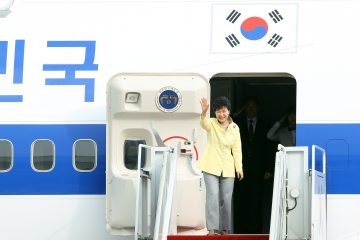OxPol Blogcast Episode 5: Biden’s North Korea Policy
Welcome to the OxPol Blogcast, a podcast where we will be sharing research, analysis, and experiences from members of the University of Oxford’s Department of Politics and International Relations. On each, episode we will talk to a guest about a piece they’ve written for the OxPol Blog. Then, we’ll discuss their larger research agenda, their insights on conducting political science, and their time at Oxford. On this episode of the OxPol BlogCast, host Chase Harrison talks to Stipendiary Lecturer in Politics Edward Howell about Biden’s policy on North Korea, regional relations around the Korean Peninsula, and exact you conducts research on a notoriously closed off country like North Korea. Read the original blog post here: https://blog.politics.ox.ac.uk/washington-and-pyongyang-back-to-square-one/
Washington and Pyongyang: Back to Square One?
US administrations may change, but the North Korean problem, in all its guises, has plagued the United States for at least the past thirty years. The new Commander-in-Chief, Joe Biden, and his administration are facing increasing calls from the broader international community to clarify US policy towards East Asia, which includes China, Japan, and the two Koreas. The last Democratic administration, that of Barack Obama, focused on strengthening US bilateral alliances within the East Asian region, regional stability, and bolstering relationships with emerging powers. Yet, it did not fully address one of the greatest geopolitical challenges in the region: North Korea’s nuclear program. During the Obama administration, North Korea conducted four nuclear tests, one of which it claimed to be …
In the Orbit of Democracy: Satellite Parties in South Korea’s 2020 Parliamentary Election
The South Korean legislative election on 15 April 2020 received high attention in international news as the first national election held under the constraints of the COVID-19 pandemic. Still, voter turnout, at 66.2 per cent, was the highest in 28 years and a North Korean defector, for the first time, was elected to the unicameral National Assembly (Gukhoe). The election, which resulted in a landslide victory for the incumbent government’s party, was the first under a new electoral reform that introduced compensation seats within the proportional representation (PR) tier of the mixed electoral system. In response, both major parties set up satellite organisations that only competed for PR seats. Thereby, the major parties consolidated their hegemony in the National Assembly …

South Korea’s democracy needs greater accountability and transparency
With the Brexit vote and the election of Donald Trump, the democratic world seems to have entered an era of uneasiness and rebellion. In a part of the world remote from Europe and the United States, a relatively “young democracy”—South Korea—is not immune to the changes that are sweeping through the world’s democracies. The country is experiencing a crisis unprecedented since the 1990s when it consolidated its democracy. A recent political scandal involving President Park Geun-hye and her close friend Choi Soon-sil has spilled over politics and extended to South Korea’s politics, economy and education, leading to a far-reaching national crisis. Hundreds and thousands of South Korean citizens have taken to the streets holding up candles in protest against Park …
North Korea After Kim Jong-il
In the wake of the rather premature death of North Korean leader Kim Jong-il at the age of 69, North Korea is expected to enter a period of violent turmoil and power struggle. Kim’s heir apparent is his youngest son Kim Jung-un, who is perhaps too young in his twenties and too inexperienced in political and military affairs to receive natural respect from his fellow Koreans, particularly in the context of a socialist Confucian culture. In the expected battle royal, he will face a strong rival in his uncle Jang Seong-taek, whose wife is Kim Jong-il’s only sister and who has a strong link to the military leadership through his elder brothers (one of them, Jang Seong-U, was the commander …
South Korean Transition: A Mystery Solved By Social Policy Analysis?
On May 24, 2011 at the Nissan Centre, St. Antony’s College, the book “The Korean State and Social Policy: How South Korea Lifted Itself from Poverty and Dictatorship to Affluence and Democracy” was launched. This lively event brought together all five authors of the book: Stein Ringen, Huck-ju Kwon, Ilcheong Yi, Taekyoon Kim and Jooha Lee. Their goal was to explain the mystery of South Korea’s successful and smooth transition from authoritarianism and poverty to an affluent stable democracy. The authors stressed the importance of governance under authoritarian rule, and explored it through the prism of South Korean social policy from 1945 to 2000. Mixed governance, or state’s collaboration with other actors was at the core of the presentation and …









